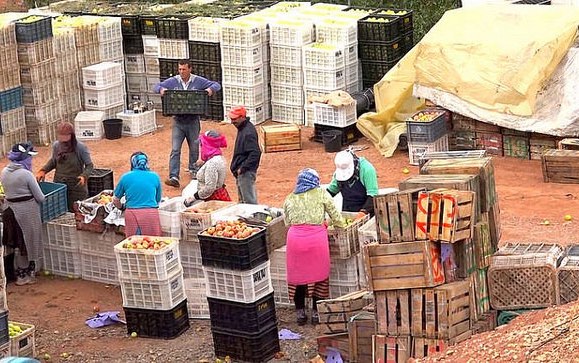Agricultural production and economic development are often neglected in policy discussions about the Middle East and North Africa (MENA) region. Since the beginning of the Arab Spring in 2010, attention has primarily focused on political transitions, instability, and the resulting refugee crisis.
These recent events are evidence of the serious development challenges the region faces. The economies of many MENA countries depend entirely on oil exports, making them vulnerable to price fluctuations. Unemployment remains extremely high, the region’s population continues to grow at rapid rates, and rural poverty persists, with 70 percent of MENA’s poor living in rural areas.
Tackling these challenges can create economic growth, improve lives, and build stability. Agriculture has a strategic importance to the region’s economy, albeit it contributes only 13 percent to the region’s GDP. The region already has scarce access to water and climate change is making it ever more difficult to provide sufficient agricultural production.
A recent IFPRI report, Agriculture and Economic Transformation in the Middle East and North Africa: A Review of the Past with Lessons for the Future, authored by Alejandro Nin Pratt, Hoda El-Enbaby, Jose Luis Figueroa, Hagar Eldidi, and Clemens Breisinger, offers a comprehensive view of the drivers, constraints, and social implications of agricultural development in the region, and explores possible starting points for new sustainable development strategies.
This study considers both regional and individual country case studies while focusing on themes that impact agricultural and economic production, like food and water security, employment, and poverty reduction. The researchers also consider how national and regional policies have shifted growth and altered the economic landscape of the region.
The concentration of economic and political power, dependence on external revenues, and profound demographic shifts have shaped the MENA region’s economic performance over the past 40 years. During the first half of this period, most countries followed a state-led development strategy defined by a series of public policies and interventions. Oil exports played a central role in this strategy for some countries, which used the external revenues to develop welfare systems intended to better distribute wealth.
Declining oil prices in the 1980s led to policy reform and economic stabilization programs. Governments reduced public expenditures and reformed exchange rate regimes, effectively reducing inflation rates and debt levels by the 1990s. Agricultural reforms differed across borders: Algeria, Jordan, Morocco, and Tunisia implemented far-reaching macroeconomic and sectoral reforms, while Egypt, Iraq, Libya, and Syria continued with the state in the preeminent economic role.
In low-and middle-income countries, the report says, labor productivity in agriculture has continued to fall behind that of other sectors, indicating that the process of structural transformation has not been smooth. This further exacerbates the wealth gap, particularly between rural and urban populations, and demonstrates the ineffectiveness of expensive policies focused on subsidies, which have failed to deliver the needed productivity increase.
A few broad policy strategies may improve the efficiency and productivity of agriculture in the MENA region, the researchers found: Reducing protection on staple crops for which the region has no comparative advantage; abandoning policies targeting self-sufficiency of staple crops, while giving priority to demand factors related to food security, like income and health; stimulating technological change and establishing policies and institutions to use water more efficiently through irrigation; and deregulating labor markets to make labor allocation and investment more efficient.
At the same time, policies must be tailored to individual nations and populations. When creating targeted interventions, it’s crucial to know which characteristics shape household decisions to remain in or leave agriculture. In addition, policies must consider the role that gender plays in such decision making, examining rural household structures to reinforce or promote women’s involvement in the economy.
Development strategies built on these recommendations should contribute to diversification of output and result in more efficient water and land use, the study says, while making labor more productive and better distributing wealth. Water usage is likely to emerge as an increasingly large threat to those living in the region, as 15 MENA countries already face extremely high levels of baseline water stress. Failure to incentivize more efficient water use may bring dire economic and environmental consequences.
Elena Hildebrandt is an IFPRI Communications Intern.







